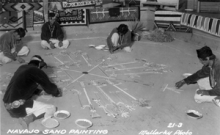Article
In the context of Native American belief systems, "medicine" is an Anglicized term referring of a range of concepts that focus on the connections between an individual or group and both the natural and the spiritual worlds. These connections at times seem to be harnessed to affect positive change that is generally discussed in terms of healing or reparation. To work or make "medicine" often entails a holistic approach that promotes balance, harmony, and equilibrium, but that also, and very pragmatically, accepts that balance, harmony, and equilibrium may manifest in a time, place, and manner other than that requested.
"Navajo men work on a sandpainting, circa 1890" by Mullarky Photo is licensed under Public Domain.
Manuscripts
A01 The Blessing Way (01-07) p. 46
A01 The Blessing Way (01-07) p. 85
A01 The Blessing Way (01-07) p. 87
A01 The Blessing Way (01-07) p. 99
A01 The Blessing Way (01-07) p. 101
A01 The Blessing Way (01-07) p. 118
A04 Dance Hall of the Dead (04-06) p. 57
A04 Dance Hall of the Dead (04-06) p. 93
A04 Dance Hall of the Dead (04-06) p. 112
A05 Listening Woman (02-13) p. 111
A05 Listening Woman (02-13) p. 112
A05 Listening Woman (02-13) p. 113
A05 Listening Woman (02-13) p. 118
A05 Listening Woman (02-13) p. 131
A05 Listening Woman (02-13) p. 220
A05 Listening Woman (02-13) p. 227
A05 Listening Woman (02-13) p. 228
A05 Listening Woman (02-13) p. 247
References
Adair, John and Kurt W. Deuschle
1970 The People's Health: Medicine and antrhopology in an Navajo Community. New York:
Appleton-Century-Crofts.
Bunzel, Ruth Leah
1932 Introduction to Zuni Ceremonialism. 47th Annual Report of the Bureau of American
Ethnology. Washington, D.C.:U.S. Governmnet Printing Office: 467-544.
Ch'iao, Chen
1971 Continuation of Tradition in Navajo Society. Taipei: Institute of Ethnology, Academia
Sinica.
Sasaki, Tom Taketo
1960 Fruitland, New Mexico: A Navajo Community in Transition. Ithaca: Cornell University
Press.

